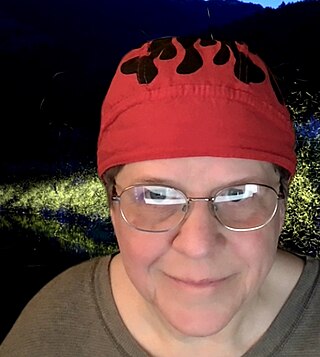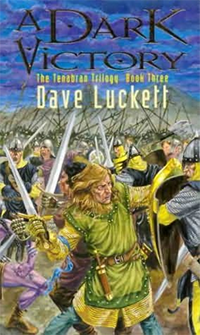Brian Caswell is an Australian author of young adult fiction.

Nina Kiriki Hoffman is an American fantasy, science fiction and horror writer.

Marianne de Pierres is an Australian science fiction author. Born in Western Australia, she finished her undergraduate studies at Curtin University in Perth and later studied a Postgraduate Certificate of Arts in Writing, Editing and Publishing at the University of Queensland. In 2019, she completed her PhD in Creative Writing at the University of Queensland.

Sean Llewellyn Williams is an Australian author of science fiction who lives in Adelaide, South Australia. Several of his books have been New York Times best-sellers.
Alex Isle is an Australian author. He writes both novels and short stories in the science fiction/fantasy genre, as well as books and articles of nonfiction, for both adult and young adult audiences.
Michael Pryor is an Australian writer of speculative fiction.
The Aurealis Awards are presented annually by the Australia-based Chimaera Publications and WASFF to published works to "recognise the achievements of Australian science fiction, fantasy, horror writers". To qualify, a work must have been first published by an Australian citizen or permanent resident between 1 January and 31 December of the corresponding year; the presentation ceremony is held the following year. It has grown from a small function of around 20 people to a two-day event attended by over 200 people.
The Aurealis Awards are presented annually by the Australia-based Chimaera Publications and WASFF to published works in order to "recognise the achievements of Australian science fiction, fantasy, horror writers". To qualify, a work must have been first published by an Australian citizen or permanent resident between 1 January and 31 December of the corresponding year; the presentation ceremony is held the following year. It has grown from a small function of around 20 people to a two-day event attended by over 200 people.
The Aurealis Awards are presented annually by the Australia-based Chimaera Publications and Conflux Inc to published works in order to "recognise the achievements of Australian science fiction, fantasy, horror writers". To qualify, a work must have been first published by an Australian citizen or permanent resident between 1 January and 31 December of the current year; the presentation ceremony is held the following year. It has grown from a small function of around 20 people to a two-day event attended by over 200 people.
The Aurealis Awards are presented annually by the Australia-based Chimaera Publications and WASFF to published works in order to "recognise the achievements of Australian science fiction, fantasy, horror writers". To qualify, a work must have been first published by an Australian citizen or permanent resident between 1 January and 31 December of the corresponding year; the presentation ceremony is held the following year. It has grown from a small function of around 20 people to a two-day event attended by over 200 people.
The Aurealis Awards are presented annually by the Australia-based Chimaera Publications and WASFF to published works in order to "recognise the achievements of Australian science fiction, fantasy, horror writers". To qualify, a work must have been first published by an Australian citizen or permanent resident between 1 November of the prior year and 31 October of the corresponding year; the presentation ceremony is held the following year. It has grown from a small function of around 20 people to a two-day event attended by over 200 people.

Eye to Eye is a 1997 young adult science fiction novel by Catherine Jinks. It follows the story of Jansi who while scavenging in the desert comes across a damaged star ship which contains a computer that has the ability to project thought, expression and friendship.

Singing the Dogstar Blues is a 1998 young adult science fiction novel by Alison Goodman. It follows the story of Joss who is a student of time travel and has been given the task of being the study partner of the alien student Mavkel.

A Dark Victory is a 1999 young adult fantasy novel by Dave Luckett and is the last book in the Tenabran Trilogy. It follows the story of how Will is preparing for his final battle as Prince Nathan's armies mass on the moors.
The Aurealis Awards are presented annually by the Australia-based Chimaera Publications and WASFF to published works in order to "recognise the achievements of Australian science fiction, fantasy, horror writers". To qualify, a work must have been first published by an Australian citizen or permanent resident between 1 January and 31 December of the corresponding year; the presentation ceremony is held the following year. It has grown from a small function of around 20 people to a two-day event attended by over 200 people.
The Aurealis Awards are presented annually by the Australia-based Chimaera Publications and WASFF to published works in order to "recognise the achievements of Australian science fiction, fantasy, horror writers". To qualify, a work must have been first published by an Australian citizen or permanent resident between 1 January and 31 December of the corresponding year; the presentation ceremony is held the following year. It has grown from a small function of around 20 people to a two-day event attended by over 200 people.

Stuck in Fast Forward, also known as The Hunger of Time in an expanded edition, is a 1999 young adult science fiction novel by Damien Broderick and Rory Barnes. It follows the story of Donald and his family who decide to travel forward in time in order to wait out the disaster and destruction that the world has become.
Anna Fienberg is an Australian writer of young adult fiction and children's literature.
David Hewitt McRobbie is an Australian writer of television, radio and children's literature.
Natalie Jane Prior is an Australian writer of children's literature and young adult fiction.







